#National Renaissance Party
Explore tagged Tumblr posts
Text
There's a problem with how Anton LaVey's Wikipedia article describes his politics, specifically that LaVey was "a member of James Madole's neo-fascist National Renaissance Party."

LaVey was a member of James Madole's neo-fascist National Renaissance Party. Due to Madole's opposition to Christianity, he sought new religious ideas and was attracted to a merging of fascism and Satanism that led an alliance between LaVey and Madole. Black Sun by Nicholas Goodrick-Clarke states, "James Wagner, a former Security Echelon (SE) commander, recalls that relations between the NRP and the Church of Satan, founded in 1966 by Anton Szandor LaVey, were cordial. Madole and LaVey frequently met at the NRP office and in the Warlock Bookshop in New York."
If we follow the citation, it's to "Black Sun: Aryan Cults, Esoteric Nazism and the Politics of Identity (Chap. 4) by Nicholas Goodrick-Clarke (2001, ISBN 0-8147-3155-4)"
But that source in Chapter 4, "Imperium and The New Atlantis" just claims Anton LaVey spent lots of time with James Madole.
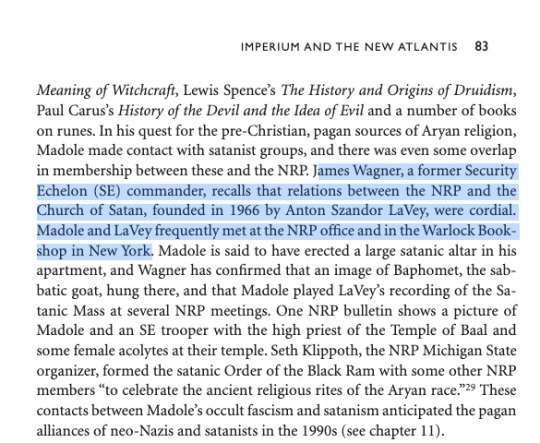
In his quest for the pre-Christian, pagan sources of Aryan religion, Madole made contact with satanist groups, and there was even some overlap in membership between these and the NRP. James Wagner, a former Security Echelon (SE) commander, recalls that relations between the NRP and the Church of Satan, founded in 1966 by Anton Szandor LaVey, were cordial Madole and LaVey frequently met at the NRP office and in the Warlock Bookshop in New York. Madole is said to have erected a large satanic altar in his apartment, and Wagner has confirmed that an image of Baphomet, the sabbatic goat, hung there, and that Madole played LaVey’s recording of the Satanic Mass at several NRP meetings. One NRP bulletin shows a picture of Madole and an SE trooper with the high priest of the Temple of Baal and some female acolytes at their temple. Seth Klippoth, the NRP Michigan State organizer, formed the satanic Order of the Black Ram with some other NRP members “to celebrate the ancient religious rites of the Aryan race.” These contacts between Madole’s occult fascism and satanism anticipated the pagan alliances of neo-Nazis and satanists in the 1990s (see chapter 11).
So, this excerpt doesn't support the claim that Anton LaVey was a member of the neo-Nazi National Renaissance Party; there's no citation with further information in the book, and the subject doesn't come up in the referenced Chapter 11, "Nazi Satanism and the New Aeon", either.
HOWEVER, Jeffrey Kaplan's "The post-war paths of occult national socialism: From Rockwell and Madole to Manson" talks about the same subject, and it includes a letter from Anton LaVey to future Church of Satan apostate/Temple of Set founder Michael Aquino.
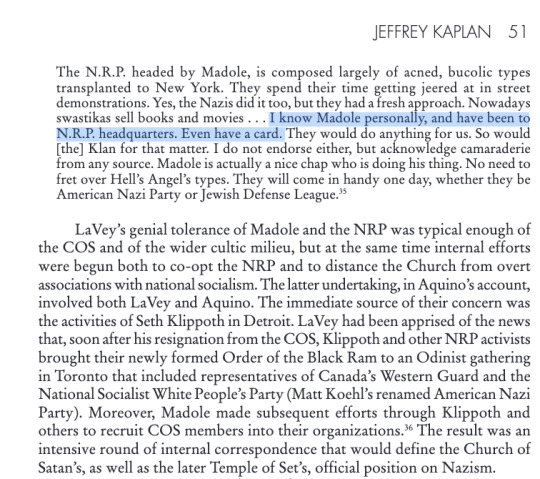
Anton LaVey: "I know Madole personally, and have been to N.R.P. headquarters. Even have a card."
Footnote 35: Letter from Anton LaVey to Michael Aquino, 24 June 1974, in The Church of Satan, 3rd edn (San Francisco: Michael Aquino 1993), 270.
This would seem to indicate rather directly that Anton LaVey was a literal card-carrying member of the neo-Nazi group "National Renaissance Party" in the 1970s, in addition to being personally genial with its founder James Madole, and fairly blasé about all that.
None of this is especially surprising.
We've talked before about how the clip of Anton LaVey using all of slurs was fully in line with his life, the people he associated with, and his fundamental philosophy.
To preempt some Church of Satan criticisms, yes, we would like to see a bit more evidence of Anton LaVey being a member of the National Renaissance Party than one stray reference in personal correspondence.
Also: the Wikipedia article should at least cite the right thing.
And as ridiculous as it may be to parse this, even if Anton LaVey was a literal Nazi party member, often agreed with Nazis, adored Nazi aesthetics, complimented fascism, and got along well with white nationalists — that doesn't mean that LaVey was himself ideologically a Nazi.
Ruben van Luijk's "Children of Lucifer" Chapter 8: "Tribulations of the Early Church" gets into this distinction.

Yet the most important reason for LaVey’s affinity with the National Socialists remains without doubt the ideological resemblance they displayed on many points.

Meanwhile, it must be emphasized that this affinity with the radical Right did not mean that LaVey also accepted the racist agenda of Nazism.
Ultimately, Anton LaVey had a lot of weird beliefs, but white nationalism wasn't one of them.
It just also wasn't a deal-breaker for him.
So the fact that fascist movements around the world and in history have been filled by people exactly like LaVey ought to be instructive.
#Anton LaVey#Church of Satan#James Madole#National Renaissance Party#facism#Neo-Nazis#Nazi Satanists fuck off#Ruben van Luijk#Nicholas Goodrick-Clarke#Michael Aquino
16 notes
·
View notes
Photo
The following is from this 2001 paper by Jeffrey Kaplan titled, The post-war paths of occult national socialism: From Rockwell and Madole to Manson.
In the paper and presumably original correspondence, LaVey's use of slurs are unredacted, but for Tumblr, you should be able to figure the censored words out (citations at bottom)
Begin excerpt:
----------------------------------------------------------------------
But [James] Madole’s occultism was of another level altogether. Here, his florid imagination both reflects the occultist currents of the cultic milieu of his day and serves as a kind of archetype of imagined history in which the white race is credited with every achievement of human civilization. Best stated in his ongoing ‘New Atlantis’ series in the National Renaissance Bulletin of the 1970s, Madole outlines his conception of the past glories of the race and he chiliastic world to come. In his own words, Madole states that the series’ purpose is to ‘impart to ARYAN MAN both his immense racial heritage stretching back over ONE MILLION YEARS into prehistoric times and his forthcoming Divine Mission to create a higher type of humanity beside which mankind of the 20th century will appear as mental and physical anachronisms ’.[31] Built of an idiosyncratic reading of history and such spiritualist sources as Madame Blavatsky and the theosophists, Madole writes:
The subhuman elements in our society, dominated by the accursed Jew, can only intimidate and govern Aryan Man while he remains in abject ignorance of his glorious racial heritage derived from the hoary archives of Lost Atlantis, Tibet and Mother India. In short, as long as Aryan man remains Christian he will inevitably remain a slave to the Jew who imposed his Semitic heresy upon the Aryan mind![32]
This formulation was not new, but what was more important was that, unlike other antisemites of his generation, James Madole was not taken by surprise by the occult explosion of the late 1960s. Rather, he was a man ahead of his time for whom the new proliferation of religious experimentation was tailor-made. Pushing ever further into these explorations, Madole was quickly aware of the formation of Anton LaVey’s Church of Satan (COS), and maintained an active and friendly correspondence with LaVey himself. Moreover, such explicitly racialist satanic organizations as the Detroit-based Order of the Black Ram, formed by the Michigan state organizer of the NRP, Seth Klippoth, may be traced to Madole ’s early influence; and it maintained close contact with him and his NRP throughout the 1970s.[33] Interestingly, the Order of the Black Ram did not choose to make its connections to Madole or its racialist origins and intent part of its own official history, emphasizing instead only its connection to the Church of Satan. 34 The Church of Satan’s internal correspondence, however, is much more illuminating on the matter. This material well illustrates both the intertwining of occult and racialist belief systems and the transnational appeal of racialism’s occult path. The material is reproduced in Michael Aquino ’s unpublished history of the Church of Satan, in which he got his start in the world of satanism and where, before his break with Anton LaVey, he was a member of the COS’s governing Council of Nine. LaVey’s attitude towards Madole is instructive:
The N.R.P. headed by Madole, is composed largely of acned, bucolic types transplanted to New York. They spend their time getting jeered at in street demonstrations. Yes, the Nazis did it too, but they had a fresh approach. Nowadays swastikas sell books and movies . . .I know Madole personally, and have been to N.R.P. headquarters. Even have a card. They would do anything for us. So would [the] Klan for that matter. I do not endorse either, but acknowledge camaraderie from any source. Madole is actually a nice chap who is doing his thing. No need to fret over Hell’s Angel’s types. They will come in handy one day, whether they be American Nazi Party or Jewish Defense League.[35]
LaVey’s genial tolerance of Madole and the NRP was typical enough of the COS and of the wider cultic milieu, but at the same time internal efforts were begun both to co-opt the NRP and to distance the Church from overt associations with national socialism. The latter undertaking, in Aquino’s account, involved both LaVey and Aquino. The immediate source of their concern was the activities of Seth Klippoth in Detroit. LaVey had been apprised of the news that, soon after his resignation from the COS, Klippoth and other NRP activists brought their newly formed Order of the Black Ram to an Odinist gathering in Toronto that included representatives of Canada’s Western Guard and the National Socialist White People’s Party (Matt Koehl’s renamed American Nazi Party). **Moreover, Madole made subsequent efforts through Klippoth and others to recruit COS members into their organizations.[36] The result was an intensive round of internal correspondence that would define the Church of Satan’s, as well as the later Temple of Set’s, official position on Nazism. It is important to note that neither Aquino nor LaVey saw German National Socialism and the figure of Adolf Hitler in a negative light. To Aquino, Mein Kampf, if read with the mental resolve to eliminate its references to antisemitism as a mere personality quirk of the Führer, is an unrivalled political textbook whose efficacy meets the primary satanic criteria for excellence: it and the governmental doctrines that were propounded under its blueprint work, for they ‘are the true essence of political power’.[37] It is with antisemitism, however, that the COS parts company with Nazism:
Now you may understand why all avowed neo-Nazi groups are pariahs in the eyes of the Church of Satan. First, they know nothing of the true keys of power employed by Hitler. Instead, they glorify the anti-Semitism and the more ostentatious attributes of Nazi Germany which have been glamorized by Hollywood. Secondly, they openly champion Nazi Germany by name, setting themselves up publicly against the Auschwitz taboo. Thirdly, they propose 1930s solutions to 1970s problems.[38]
Aquino concludes with the accurate observation that these ‘Hollywood Nazis’ are regarded by most Americans as ‘refugees from a loony bin ’, and that, if their longed-for right-wing backlash did occur in the United States, they would be the first to be eliminated since an American Führer would appear in a business suit rather than a swastika armband, and would be touting the values of America in 1776 rather than Germany in the 1930s.[39] LaVey himself endorses these sentiments, but reveals a more Machiavellian turn of mind. Based on his own experience with the NRP and its leader, LaVey sets out the foundation for much of the later interaction between the satanic and the national socialist worlds that would be so prominent a feature of the 1990s movement:
The N.R.P. is enamored with the Church of Satan. Their racist ideals are also worn on their sleeves and, I believe, are as removable as their armbands . . . symbolism and symbolism alone supplied their identity. That is how it is with most outlaw groups. There are only two ingredients necessary for their existence: a symbol and a scapegoat. The N.R.P. already has the swastika, but obviously is drawn to our sigil. They have the ‘Jews and N----rs’, but if properly propagandized could transfer their wrath to our enemies. How? Through just such extensions of propaganda as Occult Reich which have emerged from Satanic Rituals . . . [Their belief patterns are simple and we] are dealing with intelligence levels on which ideals and imagery are easily interchangeable . . . All my life I’ve been the weakling, [they think,] but with my swastika I am strong. My Satanic amulet gives me power. I’m not a misfit anymore, with pimples and a heart murmur and flat feet. What does it matter if I can’t play baseball or spell too good? So what if I can’t get a girl—I got my armband. . . Maybe we can get the C/S to help us defeat the k-kes and n----rs so America can be pure again . . .[40]
It is this desperate search for allies and acceptance in the face of nearly universal hostility and scorn that makes the national socialist enthusiasts under Madole such ideal candidates for recruitment into the satanist churches. In the event, LaVey proved prophetic, for this would be a major pattern in the milieu of the transnational radical right of the 1990s.
James Hartung Madole died in 1978. His mother Grace tried to keep the already nearly defunct National Renaissance Party alive for the last two years of her life, to little effect. In an irony that perfectly symbolized Madole’s life’s work, the last leader of the NRP died in a common street mugging and the organization ’s records were scattered to the winds over the blood-spattered highway.[41]
Yet it was Madole who did much to establish trans-Atlantic contacts, open new paths to national socialist beliefs, and keep the flame of national socialism alive in the bitterly hostile post-war years. His organizational model, not to mention the use of uniformed activists, predated Rockwell’s own American Nazi Party, and it is likely that much of Rockwell ’s early organizational structure was borrowed in toto from the NRP, through the defection of Matt Koehl among others from the NRP to the American Nazi Party.
It is true that national socialist occultism does not appeal to all national socialists, and even today is a minority trend in the world movement. But in the 1990s it is a vital and much travelled path, whereas, in the 1950s and early1960s, it was virtually unheard of —especially in the United States. Madole was simply decades ahead of his time, and his current obscurity is very much a product of this isolation.
[31] Madole, ‘The New Atlantis’, part 8, National Renaissance Bulletin, July–August 1975, 5.
[32] Ibid., part 9, National Renaissance Bulletin, March–April 1976, 4.
[33] ‘James Hartung Madole’, 25–6. The events are described by Madole himself in the National Renaissance Bulletin, March and April 1974. A sample of Madole ’s early recruiting pitch to Church of Satan adherents is preserved in a letter to COS member Stuart Levine dated 17 September 1974: ‘. . . I am trying to find a small group of people [and] utilize their services inbreaking some of our NRP officers and men into the more advanced concepts of occult philosophy’ (Aquino, 272). It is rather par for the course among American antisemitic leaders that at no time does Madole remark on the Jewish-sounding name of his correspondent, nor does his antisemitism inhibit him from taking Levine into his confidence.
[34] ‘A brief history of satanism in Detroit’, in An Introduction to the Order of the Black Ram (Warren, MI: Order of the Black Ram n.d.), 1–2
[35] Letter from Anton LaVey to Michael Aquino, 24 June 1974, in Aquino, 270.
[36] Aquino, 269–70. On the Western Guard and other far-right movements in Canada, see Stanley R. Barrett, Is God a Racist? (Toronto: University of Toronto Press 1987).
[37] Aquino, 271.
[38] Ibid.
[39] Ibid.
[40] Letter from LaVey to Aquino, 5 July 1974, in Aquino, 271–2.
[41] ‘James Hartung Madole’, 26.
----------------------------------------------------------------------
End of excerpt and citations.
Now, a person looking to defend the Church of Satan and LaVey here would be quick to point out all of those included caveats: it's less that LaVey was himself a bigot than that he just thought he could exploit bigots for his own purposes. A really motivated person might even claim that if the ultimate source for the correspondence is Michael Aquino, it should be disregarded entirely.
However, the point is that LaVey and the Church of Satan were incredibly friendly to literal neo-Nazis and white nationalists for decades, worked with them, complimented them, and in the case of Boyd Rice, allowed him to have enormous prominence within the organization as someone personally close to LaVey. None of this relies on trusting Aquino; a lot of it is just the things LaVey and people like Peter Gilmore wrote and disseminated either directly or as official stances of the Church of Satan.

“Well, uh, now that you mention it, I did not know about Anton LaVey’s longstanding friendship with James Madole, leader of the neo-Nazi National Renaissance Party. And I suppose you have a point when you say LaVeyan satanism is, in your words, ‘a clumsy assemblage of plagiarized Social Darwinist cant and badly misunderstood paraphrases of Nietzsche,’ but, little girl, I don’t see why you have to call me a ‘fake-ass sophomore year Thelemite who uses tarot cards from Barnes and Noble.’”
#Anton LaVey#Church of Satan#James Madole#Thomas Aquino#National Renaissance Party#Peter Gilmore#Nazi Satanists fuck off#satanism#satanist
572 notes
·
View notes
Text
The Age of Louis XIV

Voltaire, who wrote Le sciècle de Louis XIV (The Age of Louis XIV), started off by doing a recount of the states of Europe before Louis XIV. and my hetalia brain rot began to go wild so i figure this can help me understand the first chapter of the book better so I sorted out quotes and made a brief summary for each mentioned nation in order that is written in the book to help enforce my understanding.
Germany*
*- "Germany" refers to the Empire of Germany, known in history as the Holy Roman Empire; since the 15th century, its throne had been occupied by the Habsburgs

"...the most powerful neighbor which France has...it abounds more with sturdy men inured to labor." "this great Germanic body...is maintained in [... ] order and regularity [...] The difference of government and genius makes...the Germans [more proper] for acting on the defensive."
Summary: strong, divided into two parties by Christianity. Emperor has less power in compare to a King in France. Was at the time pretty poor despite being "rich at home", and would eventually see its flourishing later on.
Spain
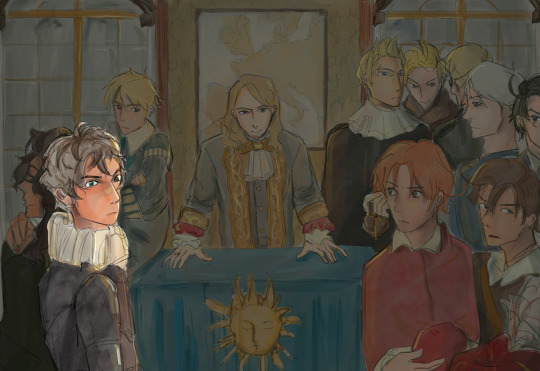
"...more formidable to Europe than the Germanic Empire. The kings of Spain were infinitely more absolute and rich than emperors..." "[Spain] under Philip II became a vast body without substance, which had more reputation than real strength...Notwithstanding all these disadvantages, Spain, by being united to the empire, threw a very formidable weight into the balance of Europe."
Summary: strong #2, starting to see its weak points, but still a ringing force and surviving well with the colonies.
Portugal
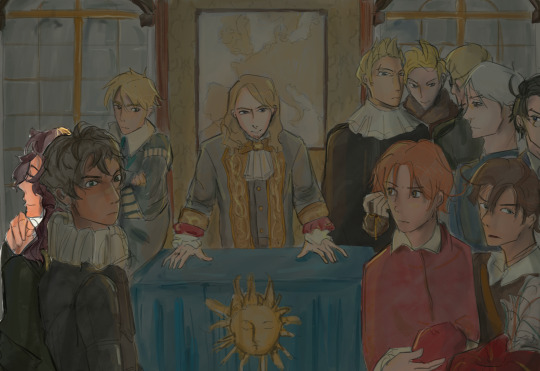
"...Portugal was again made a kingdom...through necessity, cultivated trades...entered into a league with the French and Dutch against Spain." "Portugal...extended its trade, and augmented its power..."
Summary: doing well over there. Shall watch your career with great interest.
The United Provinces
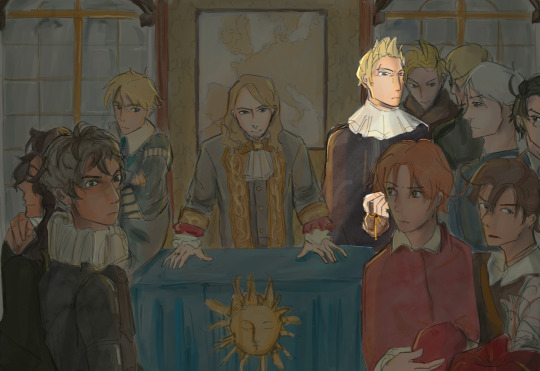
"...almost the only example in the world of what may be done by the love of liberty and unwearied labor. There poor people...made head against the whole collected force of their master and tyrant...and founded a power which we have seen counterbalancing that of Spain itself." "...they established a form of government which preserves...equality, the most natural right of human kind."
Summary: quite an admirable force (don't mess with the Dutch's money bags™️). Good government.
England
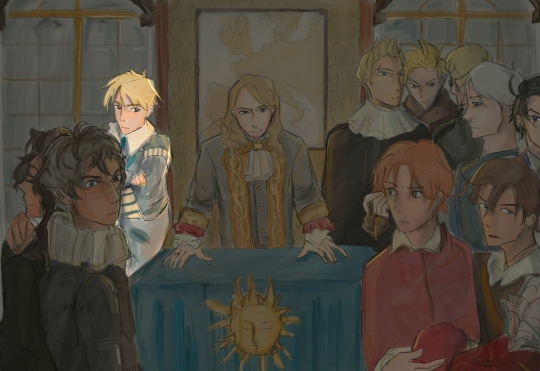
"England...arrogated to itself the sovereignty of the seas, and pretended to preserve a balance between the powers of Europe." "This civil war...[made England] lost [...] credit in Europe...trade was obstructed, and other nations looked upon [England]...till the time that she at once became more formidable than ever, under the rule of Cromwell."
Summary: pirate arc of England sprouting. Charles I could do well in anything but being a king ("ill-advised prince"). Waiting for Cromwell to do his thing.
Rome/The rest of Italy
I merged these two parts together for ✨aesthetics✨
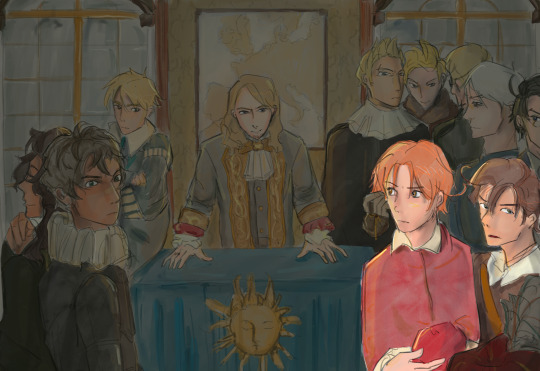
"[Rome] has very little trade or money. [Rome's] spiritual authority...is slighted and abhorred by one half of Christendom...yet [...] some [...] resist [Rome's] will at times with reason and success." "but [the privileges] of Rome, by an almost constant proper use of resolution and concession, has preserved all that was humanly possible for her to preserve." "Some rights, many pretensions, patience and politics are all that Rome has left now of that ancient power..."
Summary: typical pope behavior, but in reality was losing respect and control. Impressively that was dealt with seasoned insight, and different oppositions of different kings/emperors were met with different levels of defense ("submissive...terrible to..acting cunningly"). Sly old fox, if you will.
"...situated in a peaceble country...biassed by various interests." "The state of Florence enjoyed tranquility and abundance under [...] Medici; and literature, arts, and politeness [...] still flourished there."
Summary: the typical Renaissance still doing the thing. Less disturbed by conflicts compared to the northern parts.
The Northern Kingdoms
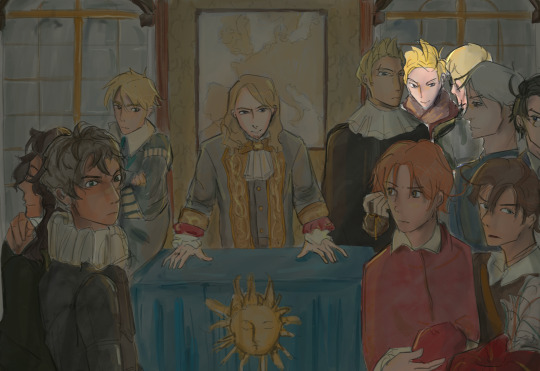
"The Swedes [...] were a freer nation by their constitution which admits even the lowest class of the people into the assembly of the general estates." "Denmark...was no longer so [formidable] to any power."
Summary: Sweden good. Denmark flopping a bit. The rest of the northern kingdoms were doing their best (fighting)
The Turks

"The seraglio, though corrupted by effeminacy, still retained its cruelty...when it had [recovered from wars], this empire became again formidable."
Summary: may look messy back home but still don't underestimate the power
The situation of France

"France [...] was in alliance with Sweden, Holland, Savoy and Portugal...was engaged in a war against the empire of Spain...The French there has done the Spaniards and Germans a great deal of mischief, and had suffered as much themselves."
Summary: fighting with Spain (and also the house of Austria, so also Germany), tho the battles has reduced to petty squabbles over "a few frontier towns". Richelieu came to raise tax.
---
Works cited The Works of Voltaire. A Contemporary Version. A Critique and Biography by John Morley, notes by Tobias Smollett, trans. William F. Fleming (New York: E.R. DuMont, 1901). In 21 vols. Vol. XII.
--- Rambling (just a little) time.
Okay first off, bear in mind that all the quotes and summarized content are from the pov of Voltaire, so there can be possible biases.
I've been invested in the reign of Louis XIV for quite a while now, and I can attribute the reasons to 1) BBC Versailles, 2) Molière, and 3) general liking to history at the time (17-18c). I'm trying to figure out what exactly that the time period attracted me so much, like what "vibe" what "ideal" etc, but I'm still trying. And reading that book, which is long as hell, not to mention the messy af™️ European drama and people having Too Similar Names may just be helpful in terms of getting to know the history that happened in and around the court of Louis XIV.
Welp, gotta read more if I want to know more.
#hetalia#aph#historical hetalia#i will be lazy and not tag everyone sorry not sorry#doodle dump#random otter rattles#history
174 notes
·
View notes
Text
PURE HEROIN



finnick odair x reader
synopsis. ꩜ pure heroin is a drug that’s only good for so long. for you it came in the form of capitol parties and other people’s beds, and eventually in the form of the nation’s golden boy.
warnings. ⨾ alcohol consumption, drug use, smoking, smut (warnings will be in each chapter), injury, mentions of prostitution.
author's note. ∿ i’d like to thank netflix for the hunger games renaissance

PART I . . . what meets the eye
PART II . . . delirious
PART III . . . harder to breathe
PART IV . . . old habits die hard
PART V . . . regret me
PART VI . . . i can’t quit you baby*
PART VII . . . sober*
PART VIII . . . epilogue

#finnick odair#finnick x you#finnick x reader#finnick ordair fluff#finnick ordair angst#finnick odair x reader#finnick odair x y/n#finnick odair x you#the hunger games#the hunger games catching fire#mockingjay#peeta mellark
366 notes
·
View notes
Text

—🍊. 𝐒𝐔𝐍𝐒 𝐎𝐔𝐓 𝐀𝐔'𝐒 𝐎𝐔𝐓
this is not a writing challenge, this is just a list of summer au's that have been collecting dust in my google docs that i'm both sick of looking at, and also feel like for those who also really enjoy writing summery fics, could always use more inspiration or ideas for au's or scenario's (even if it's just smutty or fluffy blurbs).
please make note that anyone can use these for any fandom or character. it's literally for everyone, for whatever ship, gender, or verse. no one owns au's and everyone makes them their own and writes differently. so please do with the content below as you wish!!
you don't gotta tag me if you use one but would i love to read your beautiful work? hell yeah so feel free to if ya feel like it.
i separated each into categories + some might have added context or prompts because i have zero self control and like to be extra and add ideas onto things lmao.
hopefully someone finds these fun and helpful, happy writing my loves <3
LOCATION.
beach
ocean
ice cream parlor
lake town
ranch
summer camp
summer school
island
boat
fishing town
resort
the woods
national park
public pool
destination wedding
renaissance fair
lake house
bar
theme park
capecod
italy
winery / vinyards
country club
cruise ship
concert
RELATIONSHIP BASED.
brothers best friend ('unfortunately' spending the summer with your family)
neighbors au
exes back for the summer
bodyguard au (character a has to follow around reader whose some princess/rich girl on a vacation, bonus points if she's supposed to be on lockdown but refuses to stay at the hotel, even more bonus points if her parents sent her on this vacation as a rehabilitation for her bad habits)
best friends dad (you're spending the summer with your bestie and god her dads hot as hell)
mermaid x human
frat boy x good girl (last minute studying together before summer break, or maybe the frat is throwing a big grad party and reader decides to let loose for the first time in forever)
frat boy x sorority girl (it's giving rich hoes who can't stand each other who get caught doing something and have to do community service with each other alllll summerrrrr long, can you think of anything worse?!)
sitcom stars (they're both on some summer love show but fall for each other instead, or you're two celebs supposed to be fake dating on some mtv drama show in palm springs but you actually fall for each other)
park ranger x someone who thought going camping alone would be fun but oh shit i know nothing about the wilderness au
ex-best friends ex (a summer love but put revenge and 'we're only fucking because this friend screwed me over and it'll really show them' au anyone??)
lifeguard x parent au (or you saved my life let me repay you wink wink)
dads best friend
house sitter x house owner (or neighbor, or family member who came home early and wtf are you doing here and who are you?? or even the old i asked the neighbor to watch our house but also my wife wink wink)
babysitter who tags along on vacation with the family au
fake dating (for the summer)
friends to lovers was made for summer au's!!!
superhero x vigilante (nightly meet ups to keep the streets safe)
friends with benefits but only for the summer au
painter x muse
body found on beach x person who found them (+ the added bonus of the two of them working together to figure out wtf happened and how they got there)
sugar baby x sugar whathaveyou (free vacation? hell yeah)
roommates (renting a room for summer what could go wrong)
tour guide / local x tourist
camp counselor x parent of camper
friend group on a drama filled vacay au
the only single people at this resort for couples au
sad housewife x pool boy
DARK THEMED.
cult au
slasher au
hitchhiking gone wrong (or right)
monster au (summer is the perfect time to go exploring for the monster in the woods or the lake, ocean even, obviously)
haunted house au
ghost hunting au
hunter x prey (bonus points if they don't know they're being hunted until it's too late)
safe house au (gone wrong)
kidnapping au (it's giving 365 days but less shitty ok)
stranded au (on an island, in a creepy town, etc)
bestie's trip gone wrong au (the innocent looking guys at the pool who are gorgeous are actually super shitty and deadly omg, or the couple in the hotel room next to us are insane wow, or someone is killing us off...but it's someone within the friend group)
stuck in an abandoned amusement park au
INSPIRED BY.
grease au
dirty dancing au
x au (70s-80s pornstars au + added slasher element if ya wanna make it dark)
daisy jones & the six / rocker au (summer tour anyone?)
the white lotus (cheating au?? a couple hoping a vacation will fix their marriage, maybe even the whole shitty husband leaves you there and you fall for one of the resort workers)
50 first dates au (but make it 'i bet i can make you fall in love with me by the end of summer)
jurassic park au
i know what you did last summer au
friday the 13th au
the final girls au (aka you end up in your favorite movie and have to find your way out with a side of 'oh shit there's my fav character what if i stayed and made them fall in love with me instead', or go full final girls au and you're stuck in a cult horror movie and have to survive the night to get out of it)
outer banks / goonies au
schitt's creek au
romeo and juliet (1996) au
mama mia au (the prequeal tho aka boning a bunch of people and omg i'm pregnant who is the baby daddy tho??)
overboard au
OCCUPATIONS.
naturalist
farmers market vender
dog walker / dog sitter
dive bar singer
surfer
swim instructor
vet
journalist
camp counselor
author
cowboy
undercover pi
contractor
car wash attendant
lifeguard
gardener / landscaper
summer intern
tour guide
tutor
nanny
theme park owner
bartender
house sitter
summer farmhand
golf course caddy
sign-holder
movie theatre worker
uber driver
wedding photographer
hotel receptionist
RANDOM.
heatwave (how ever will we stay cool?)
shipwreck / stranded on an island au
rainstorm / hurricane au (stuck inside oh no what will we do??)
love triangle that shit
matchmaking au
love letters in a bottle au
drunken karaoke
kissing in the rain is top tier
workaholic letting loose au
(illegal) car racing au
road trip au
#feel free to add to this list if you wish#writing prompts#writer resources#fic au's#prompts#fic resources#au's#writing reference#fic help#resources !
334 notes
·
View notes
Text
"is it about nationalism again" yes. shut up.
finally figured out what my paper is on. now i have uhhh. five days to write it
#its part of my div what did u want me to do. NOT write about nationalism ?????????? get real#if this was allowed to be a research paper i could write smth really swaggy about the construction desctuction and revision of historical..#...narrative during regime shifts to support the party line and whatnot but. alas.#if this was an even cooler research paper i would write about what historical time periods and events were focused on at different times...#...and how they were examined and whatnot and how those historiographies were subsequently used.#1950s czechoslovakian study of the hussite revolution and 19th c national renaissance glorified through a communist lense vs mid 1960s....#....popularisation of the early medieval bohemia and the baroque period alongside cultural and political changes.............ough#sigh#what the fuck ever#ceci says stuff
4 notes
·
View notes
Text
rebelcaptain fantasy mermaid AU since I'm apparently not done daydreaming about them rn.
Jyn Erso is mer nobility, being the daughter of a powerful sorcerer in the royal court. She's expected to be a prim lady, and she's certainly educated enough, but she much prefers sparring with soldiers or scavenging through human shipwrecks over mincing words at tea parties. many other nobles look down on her for her adventurous hobbies, especially since the Emperor has forbidden contact with the human world, and collecting surface world trinkets is pushing the boundaries as it is.
Cassian Andor is a captain in his kingdom's royal navy. He's unassuming, but he's skilled in so many different areas - including leadership and strategy - that it would be a waste to not place him in a position of authority. For this rank, he is also revered by the court as a member of high society. Admiral Draven often sends Cassian and his crew on scouting missions and the sort when the stakes are high and the weather is certain to be treacherous (mer have been making life difficult for ocean-going humans for the past generation or so, whether out of spite or territorial disputes, no one is sure. some believe the emperor is just salty about - quite literally - losing his right-hand man, who was a sorcerer powerful enough to bring the kingdom to unprecedented levels of subjugation)
Under the rule of her majesty Queen Amidala (shut up about continuity parallels and let me play with dolls), the human kingdom of Coruscant is thriving. Their sea trade suffers from the hostile weather, but everything else is going great! bountiful crops, art renaissance, good relations with neighboring nations and provinces, etc. in fact, their prosperity is their main drive for all attempts to open new routes by sea; they want to share their wealth with other countries and explore new lands in peacetime. (the king consort privately advises against this transportation of choice, but the presence of many powerful magic wielders in the ranks of the navy, including the prince, has perhaps lulled the queen into complacency about this).
it isn't until the worst storm of the season manages to catch Cassian's ship and wreck it along the coast that the humans begin to feel concern. He was tasked with escorting the princess home after a diplomatic trip to the neighboring kingdom of Alderaan. Their ship was laden with treasure and gifts, and ill-suited to maneuvering in such unexpected and inclement weather. Even with Cassian's great skill as a sailor, and the power of the princess' magic, the ship is easily overcome and destroyed. possibly blown up too, depending on how dramatic you want to be.
Now of course, the mer keep track of things like ocean travelers, and the emperor has always been weird about the queen and her family. no one is surprised when he decides to target her sailing vessel with his evil storm sorcery. Jyn might be one of the few mer who doesn't care. (besides, Jyn has diplomatic immunity! it's not like she's breaking any laws by looking at the ship from a distance). Jyn loves to watch the humans exchange treasure, and she's starting to grow fond of these ones, the more she continues to find them in her waters. especially that particularly attractive man with darker hair and even darker eyes. he's as rough a sailor as the rest, but kriff is he pretty. He's so serious, he doesn't smile much. Jyn saw him do it once, and if the sight almost melted her into sea foam, well, that's between her and the ocean current she escaped on. So naturally, Jyn is drawn to the beautiful ship with its beautiful goods and beautiful people. they're so festive in ways her own kind aren't. their parties literally explode. it's so lovely to watch that she finds herself climbing up onto the ship (definitely moving into illegality there) and tucking herself beneath the banister to watch them dance. Cassian isn't dancing, but she likes to watch him too. He seems in a light mood. he's almost smiling.
Then the storm hits and the ship wrecks, and Cassian being the captain is charged first and foremost with protecting the princess. He manages to get her out before it's too late, and her magic - though much quieter and less suited to storms than her brother's - is enough to keep the survivors safe in the life boats. Unfortunately, Cassian goes down with the ship because he's a good little captain and the plot likes him. Jyn thinks it'd be a shame for such a pretty man to die. She saves him and dumps him on the nearby shore. kriff, she thinks as the sun rises on the two of them, even drowned he's gorgeous. Cassian remembers none of the rescue. He is later collected by a search party sent to retrieve stragglers and beached wreckage. the queen rewards him for his bravery and stuff.
meanwhile Jyn gets found out for her highly illicit involvement in the event. Not only is she facing scorn in high society, but she may very well be imprisoned, or made an example of (the emperor has certainly never been shy of that move before). Not to mention her parents' reputations and positions are at stake. Jyn decides to just hit the bricks. not like she was infatuated with the mer world anyway, kriffing fascist regime that it's tending towards. Logically, the move for her is to become an international fugitive! and since contact with the human world is banned, that's the last place anyone will think to look for her. She enlists the help of her mother's old radical friend, Saw Garrera. While not himself a sorcerer, he's always claimed to be in contact with a few pretty powerful ones, and sure Jyn, of course he's got a spell or two you can use to escape the ocean. She transforms herself into a human and flees the cops by washing up on Coruscanti shores. Naturally, Cassian finds her 😏 she's pretty hyped about that.
Now technically the existence of merpeople is still mythical to most humans, so Jyn is careful to keep her mouth shut. She's not totally sure the extent to which her transformation spell extends, and she has no idea if there's anyone here on land she can ask or trust to ask for further insight. Better to play it safe than risk drawing attention and the possibility of some meddlesome human witch using her for experimentation.
She settles into life on land quite easily. She's a skilled, intelligent woman, and she has experience parrying her way through high society conversations, so it doesn't take much for her to secure herself a new home in the palace. Cassian is, naturally, immediately infatuated with her. He's not sure if it's the fire in her words or her eyes or the way she sometimes sways on her feet like she expects the air to cradle her, but he's captivated. He asks Leia if it's some sort of bewitching spell. She laughs in his face. Jyn says she's from a far away country and spins a web of lies and half-truths to explain herself to the Queen's court. Cassian is enraptured by this. It's under his advisement that Jyn is granted a position in the royal navy. He says they need strong sailors with good instinct and fearless hearts, and the royal family is inclined to give him whatever he wants these days, so Jyn ends up as a rookie on his crew. They are both thrilled.
It becomes promptly clear that Jyn was high born, wherever it is that she won't say she's from, even if her brash attitude and snippy words are unladylike; she has a very particular skillset. Cassian is especially impressed with her skill in combat. She finds it very different from fighting underwater: the mechanics are all different, and the footwork is boggling her mind a bit, but she's good. scrappy and vicious and good. She's good with strategy, and good with navigation, good with words and saying what she means. it helps that she's so happy to finally be here on land, surrounded by curiosities she's held most her life. She's really thriving. It makes her very attractive.
She and Cassian also happen to work together well, frighteningly so. Though Jyn has never known how to sail, she's a quick learner, and Cassian is the perfect teacher. there's no stopping them once she's been weaponized with the knowledge. Together, they are a force to be feared on the open seas. Somehow she always knows how to avoid the storms, when they'll come and from where, to the point that the rest of the crew calls her their seabird, their good luck charm. They're able to blaze new trails and find new worlds, even reaching as far as Lothal. Life is going great! Becoming a wanted fugitive might be the best thing Jyn's ever done.
bar the part where the cops are looking for her, of course. We're gonna say that Krennic is the emperor's bloodhound for the sole purpose of just including him in the story. While not a sorcerer either, he's a (mostly) trusted tool of the emperor, and can be temporarily imbibed with magic when tasked with hunting down a runaway mermaid. idk something something, he threatens Jyn's parents, then comes on land and threatens her, and that's probably really fun for me the target audience because it gives Cassian an excuse to be stupid protective of his bestie. I'm just thinking of the vibes rn and not specific details. feel free to use your imagination here. Somehow, it's revealed that Jyn is a mermaid, and there's a dramatic battle or whatever, and in the end krennic is defeated and he drops a loot tile which conveniently holds the secret to the emperor's power. the emperor is predictably pissed about that. he is summoned from the depths to try and throw a hissy fit, ends up destroying a lot of human stuff like their ships and coastal structures. Luckily, Cassian and Jyn play relay with the loot tile that holds the secret to the emperor's power and pass it on to the princess, and the princess gives it to her loyal sheepdog, and the sheepdog gets it to the prince, and the prince and his dad (who gets out to the water despite an incredibly uncomfortable trek through a beach of sand) use the power of their combined flamboyance to summon a lightning bolt from heaven and fry the emperor's scaly butt. the end everyone lives happily ever after.
turns out btw that queen amidala totally knew about merpeople! where else do you think she got her pathetic wet hot wizard of a bride from? Anakin's more than happy to live it up on land with his cool wife and wizard kids. man he's so glad he dodged a bullet being emperor palpatine's evil enforcer. Padme's cool mermaid friend Mon is gonna take over the mer kingdom now. she's chill and she cares about justice and stuff. hooray! fascism is defeated by lightning!
Jyn's silly little criminal record is cleared now that peaceful relations between mer and humans are miraculously established, but she's really come to enjoy her life on land and her life as a sailor at Cassian's side, so she decides to get a proper transformation spell and stay. Cassian is predictably delighted.
as an added bonus, the human and mer kingdoms decide to cement their new treaty with a marriage alliance. everyone decides it should be Cassian and Jyn, since they're both prominent nobles with illustrious careers in politics (working as ferrymen for actual politicians like Leia is close enough to count). Cassian and Jyn think this is a genius move. they're very in love
#rebelcaptain#jyn erso#cassian andor#rogue one au#rogue one#star wars mermaid au#mermaid jyn erso#fantasy au#little mermaid au
18 notes
·
View notes
Text
In the more than one hundred years since Marx and the French socialists, there have been some other socialist responses to the Jews. Social Democrats, for example, have been among the strongest supporters of Jewish rights in the world. Between 1948 and 1977, Israel itself was governed by the Labor Party, which was founded on socialist principles.
But the further Left one goes, the greater the antisemitism. Wherever Marxists have come to power they have initiated government-supported antisemitism. Before the fall of communism in 1989-91, the Soviet Union and the countries of Eastern Europe expressed antisemitism against native Jews and supported those seeking to destroy Israel. And Third World Marxist countries in which no Jews live (such as China and Vietnam) also have supported groups seeking to destroy Israel and deny Jewish national rights. For example, China voted for the 1975 UN resolution delegitimizing Israel by equating Zionism with racism; in 2002, China refused to permit a long-planned exhibition about Albert Einstein to open unless references to Einstein's being a Jew and a Zionist were eliminated (the exhibition was withdrawn). Leftists in democratic societies also generally oppose Israel, Zionism, and Jewish nationalism.
From its inception in 1917, the Soviet Union was implacably hostile toward Jewish religious and national expressions. As early as 1919 Zionism was designated a counterrevolutionary movement and prohibited.
The Soviet Union's campaign to destroy the Jewish religion in the country was largely successful. Between 1956 and 1965 the number of synagogues in the USSR declined from an already very low 450 to 60. By the 1980s, there were fewer than five rabbis for the more than two million Soviet Jews. In many parts of the Soviet Union it was illegal for a male to pray in a synagogue until he had completed military service, and Soviet Jews were forbidden to take classes in Judaism or even the Hebrew language.
The only permitted books on Judaism were those printed by party-controlled publishers, and they depicted Judaism as a vulgar and immoral anachronism. Characteristic of the material about Judaism legally available in the Soviet Union was this perspective in Trofim Kichko's Judaism and Zionism (Kiev, 1968): "The chauvinistic idea of the god-chosenness of the Jewish people...the idea of ruling over the peoples of the world....Such ideas of Judaism were inculcated into the Jews first by priests an later by the Rabbis...and are inculcated today by Zionists, educating the Jews in the spirit of contempts and hatred towards other people....The ideologists of Judaism, through the 'Holy Scriptures' teach the observant Jew to hate people of another faith and even to destroy them."
While the government published and disseminated such antisemitic material, the Jewish community was forbidden to operate a single Jewish school, let alone publish pro-Jewish books. The government's attempts to annihilate Judaism was almost without precedent in Jewish history. Christian and Muslim antisemites, and for that matter even the Nazis during the 1930s, permitted Jewish schools. Because of the Soviet Communists' prohibition of Jewish education, Soviet Jews became the Judaically most ignorant Jews in history, until the renaissance of Jewish life that began in the former soviet Union with the fall of communism in 1991.
Having succeeded in stifling the ideological (I.e. God-related) and legal components of Judaism, Soviet antisemitism subsequently focused most of its attacks on Jewish nationalism. The Great Soviet Encyclopedia of 1952 defined "Zionism" as "a reactionary movement...which denies the class struggle and strives to isolate the Jewish working masses from the general struggle of the proletariat."
The Soviets attempted to destroy the Jewish national identity in a variety of ways. For example, well before neo-Nazi "historical revisionists" arose to deny the Holocaust, Soviet books and films on World War II ignored, virtually to the point of denying, the Holocaust. To cite a typical instance, in a forty-minute Russian-language film shown to Soviet visitors to Auschwitz, Poland, where over a million and a half Jews were murdered, the Jews were not mentioned.
To obliterate Jewish nationalism, Soviet propaganda went one step further and charged that Zionists worked with the Nazis. In 1979, a Soviet art exhibit "featured a grotesque painting of Russian corpses being gloated over by a grinning Nazi soldier and a grinning Jewish prisoner wearing a Star of David. The message: Nazis and Jews were collaborators." Thus, the Soviets not only denied (by omission) the Holocaust, they also used Nazi atrocities to increase antisemitism in the Soviet Union by identifying Zionism with Nazism.
After the Six-Day-War in 1967, Soviet media constantly referred to the Jewish state as a Hiterlian state. The tone for this campaign was set by the Soviet president and general secretary of the Communist Party, Leonid Brezhnev, on July 5, 1967: "In their atrocities against the Arabs it seems they [the Israelis] want to copy the crimes of the Hitler invaders."
Two years later, Yuri Ivanov published Beware Zionism, which was hailed by Komsomolskaya Pravda as "the first scientific and fundamental work on this subject." In this book, Ivanov described Zionism as an ideological offshoot of Nazism.
Both of the authors visited the Soviet Union (Dennis Prager, 1969, 1981, 1990; Joseph Telushkin, 1973) and personally witnessed its antisemitism. When Prager was asked to smuggle out material by Russian Jews detailing governmental antisemitism, he asked one writer, Tina Brodetskaya, "If these letters are published in the West, won't you be sent to prison?" "Where do you think I am now?" she responded.
In 1973, Telushkin danced with Russian Jews in front of the largest Moscow synagogue on Simchat Torah, a joyous Jewish holiday. The dancing was violently stopped by the KGB, the Soviet secret police. A Russian Jew, Dmitri Ramm, who had accompanied Telushkin to the synagogue, was beaten and his leg was fractured.
Both of us met Soviet Jews who had served long prison terms solely for seeking to learn about Judaism and/or desiring to emigrate to Israel. In one noted case, Joseph Begun, a Jewish mathematician who taught an underground Hebrew class, was fired from his job, then convicted for not working and exiled to Siberia...
Government-inspired antisemitism, coupled with renewed Jewish pride after the Six-Day War, led to a large migration of Soviet Jews, many of whom risked their lives to emigrate. Others did not succeed.
In Novosibirsk, Siberia, in 1973, Telushkin met a local Jew, Dr. Isaac Poltinnikov, who had been without work and, along with his wife, Irma, and daughter, Victoria, had been terribly harassed for the three years since hand his family had applied for a visa to Israel. Finally, in 1979, after nine years of refusals, the Poltinnikovs were given permission to emigrate. But Irma Poltinnikov and Victoria, believing it was just a KGB trick, refused to go (on previous occasions, the KGB had arrested them, subjected them to long interrogations, and killed their dog). Dr. Poltinnikov did go, and flew to Israel. The Soviets then refused Mrs. Poltinnikov and Victoria permission to join him. Irma soon thereafter died of malnutrition, and Victoria then committed suicide.
In Eastern Europe, Communist antisemitism persisted even though few Jews remained there following the Holocaust. For example, in the early 1950s, thirteen leaders of the Czech Communist Party, ten of them Jews, were accused of being "Zionist agents" and hanged. These trials were ordered as one of a series of antisemitic show trials culminating in 1953 with Stalin's "Doctor's Plot," as mentioned above. Stalin charged a group of physicians, mostly Jews, with plotting to poison to Soviet leadership. He died before the trial, but it was subsequently revealed that he was preparing to use the Doctors' Plot as a pretext to expel over two million Jews to Siberia.
In 1968, Poland's media was dominated by "the unmasking of Zionists in Poland," though fewer than one out of every fifteen hundred Poles was Jewish.
Aside from the Soviet Union and Eastern Europe, few Jews lived in Communist-ruled societies. Yet Leftists anti-Jewish hostility remained a worldwide phenomenon. The most serious antisemitic act of the 1970s, the UN General Assembly resolution declaring Zionism to be racism, was the product of an Arab, Muslim, and Communist alliance. Whereas almost the only countries opposing the resolution were democracies, every Communist government in the world (with the exception of Romania, which absented itself from the vote) declared the Jews' national movement racist and therefore illegitimate. the idea for the resolution was originally the Soviets, and among the resolution's sponsors was Cuba.
- Why the Jews? The Reason for Antisemitism, Dennis Prager and Joseph Telushkin, pages 128-133
#antisemitism#leftist antisemitism#dennis prager#joseph telushkin#jumblr#why the jews the reason for antisemitism#soviet union#history#jewish history
15 notes
·
View notes
Text

Dr. Cheikh Anta Diop (December 29, 1933 - February 1, 1986) was born in Diourbel, Senegal to a Muslim Wolof family. His family belonged to the African Mouride Islamic sect. Diop grew up in both Koranic and French colonial schools. Upon completing his BA in Senegal, he began his graduate studies at the Sorbonne in physics.
He became involved in the African students’ anticolonial movement. He helped organize the first Pan-African Student Congress in Paris and participated in the First World Congress of Black Writers and Artists in Paris.
His Ph.D. dissertation looked into ancient Egyptian history and the influence it had on European culture. He proclaimed that African civilizations were the inspiration and origin of European accomplishments. The Sorbonne rejected his dissertation, yet his work received worldwide attention. His work was published as Nations Negres et culture, a publication that would make him one of the most known and controversial historians of his era. He was awarded his doctorate by the Sorbonne. Senegal gained its independence and he returned home.
He was appointed a research fellow at Institut Fondamental d’Afrique Noire at Dakar University, where he set up a radiocarbon dating laboratory. He created political opposition parties: Bloc des Masses Sénégalaises and the Front National du Sénégal. The Bloc des Masses was banned. He founded the Rassemblement National Democratique. The RND published the Wolof-language journal, Siggi, of which he was the editor.
He was appointed professor of ancient history at Dakar University. He published several books including seven which were translated into English. His most famous works were The African Origin of Civilization: Myth or Reality; The Cultural Unity of Black Africa, and Towards the African Renaissance: Essays in African Culture and Development, 1946-1960. He received the highest award for scientific research from the Institut Cultural Africain. He was invited to Atlanta, where Mayor Andrew Young proclaimed April 4th “Dr. Cheikh Anta Diop Day.” He had two sons with his wife, Louise Marie Diop Maes. #africanhistory365 #africanexcellence
8 notes
·
View notes
Photo
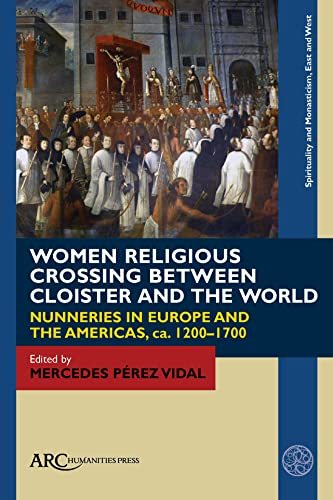
Women Religious Crossing between Cloister and the World: Nunneries in Europe and the Americas, ca. 1200–1700
This book is recommended to advanced scholars of medieval and early modern religious history. This collection of essays focuses on how women participated in and were shaped by monastic and religious life. The contribution this book makes is to examine medieval and early modern gender history through a transatlantic lens.
Women Religious Crossing Between Cloister and the World: Nunneries in Europe and the Americas, ca. 1200-1700 is the result of a collaborative research project focused on the relationships between women and the “religious.” Edited by art historian Mercedes Pérez Vidal, a research fellow at Heinrich Heine University Düsseldorf, this collection of essays analyzes religious women from the Middle Ages through the Early Modern period through a transnational lens. The Société d’Études Interdisplinaires sur les Femmes au Moyen Âge et à la Renaissance (SEIFMAR) organized the research project, and its goal was to examine how women participated in and were shaped by monastic and religious life. As a transnational undertaking, the volume also takes a comparative geographical approach to women and religious life in Europe and America.
The collection originated as SEIFMAR conference papers that were developed into articles. There are seven essays in the collection. Each essay addresses one or more of the four themes from the conference including studying religious women across time, space, and category; examining women’s agency within and outside the cloister; analyzing race and social class among religious women and studying material objects through cultural networks as a mode of creating and extending power. The essays were written by European and Latin American scholars, and each essay concludes with findings and an extensive bibliography. Chapter One by Sylvie Duval examines “Female Dominican Identities” while Chapter Five by Doris Bienko de Peralta is titled “Transatlantic Circulation of Objects, Books, and Ideas in Mid-Seventeenth Century Mexican Nunneries.” The last chapter by Annalena Müller is in French and focuses on class-based feminine power at the convent of Fontevraud in the 17th century.
Vidal makes a convincing argument that scholarship spanning continents focused on religious women, agency, and the transmission of ideas expands the historiographies of empire, nation, gender, and class. The book illustrates that religious women were political and powerful purveyors of information and played a role in shaping religious identity inside and outside of the convent both in Europe and the Americas.
This is not a collection aimed at a wide readership. It is a text aimed at medieval and early modern scholars. While the whole collection could be beneficial in a graduate classroom setting, it may be too advanced for undergraduate students. There are individual chapters such as Claudia Sutter’s piece, "In Touch with the Outside: The Economic Exchanges of the Observant Dominican Convent of St. Catherine in St. Gallen," which would work well in a European medieval course illustrating the economic exchanges of the time through the lens of gender. Miguel Garcia-Fernandez’s article, "Beyond the Wall: Power, Parties, and Sex in Late Medieval Galician Nunneries," would be interesting to those studying gender and sexuality in a medieval history course. I would recommend this collection to scholars who are interested in the intersection between medieval and early modern gender dynamics concerning religious history. The book is part of a series focused on Western and Eastern Christian communities from 500-1500 CE and could be of interest to a broader readership to those who have some prior knowledge of medieval and early modern history. In other words, this is not a book for those new to the subject. Transnational academic histories of medieval and early modern women are rather limited in terms of scholarship, and this collection contributes to understanding women’s agency, the transmission of information, and power structures through the lens of the "religious" in a new and worthwhile way.
Continue reading...
11 notes
·
View notes
Text
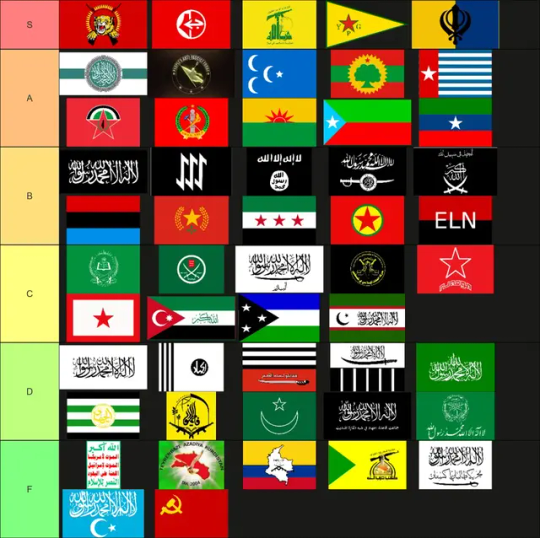
The official tier list of globally recognized terrorist organizations based off of their flag designs
This is 100% scientific fact based off of my personal research into the field of vexillology. Argue with me if you want to in the comments. There groups in order from left to right are: (S): Liberation Tigers of Tamil Eelam, Popular Front for the Liberation of Palestine, Hezbollah, People's Defense Units, Khalistan Liberation Force (A): Hayʼat Tahrir al-Sham, People's Anti-Fascist Front, Great Eastern Islamic Raiders' Front, Oromo Liberation Front, Free Papua Movement, Democratic Front for the Liberation of Palestine, Tigray People's Liberation Front, United Liberation Front of Asom, Balochistan Liberation Army, Ogaden National Liberation Front (B): Al-Qaeda, The Base, Daesh, Hurras al-Din, Congress of the Peoples of Ichkeria and Dagestan, Lord's Resistance Army, People's Liberation Army of Manipur, Syrian Revolution, Kurdistan Workers' Party, National Liberation Army (Colombia) (C): Jamiat-e Islami, Muslim Brotherhood, Al-Badr, Palestinian Islamic Jihad, Komala Party of Iranian Kurdistan, United National Liberation Front, National Liberation Movement of Ahwaz, Kamtapur Liberation Organisation, Islamic Renaissance Party of Tajikistan (D): Taliban, Jaish-e-Mohammed, Lashkar-e-Jhangvi, Lashkar-e-Taiba, Hamas, Harkat-ul-Mujahideen, Liwa Fatemiyoun, Dukhtaran-e-Millat, al-Qaeda in the Indian subcontinent, Hezb-e Islami Gulbuddin (F): Houthi, Kurdistan Freedom Hawks, Revolutionary Armed Forces of Colombia, Kata'ib Hezbollah, Tehreek-i-Taliban, Turkistan Islamic Party, Shining Path
28 notes
·
View notes
Text
FP World Brief: The Fallout of European Elections
Mainstream parties secured a slim majority during European Union parliamentary elections this weekend, but far-right groups made the most noteworthy gains in the bloc’s legislative body. “The center is holding, but it is also true that the extremes on the left and on the right have gained support,” European Commission President Ursula von der Leyen said on Sunday following the end of Europe’s four-day vote.
Among the centrist leaders forced to reckon with the far right’s rise is French President Emmanuel Macron, who called for snap legislative elections on Sunday after opposition leader Marine Le Pen’s right-wing National Rally party delivered a crushing defeat to Macron’s Renaissance party in the European Parliament elections—winning around 31 percent of the vote compared with the Renaissance delegation’s less than 15 percent. France’s snap elections will take place on June 30 and July 7.
“The rise of nationalists, of demagogues, is a danger for our nation but also for our Europe, for France’s place in Europe and in the world,” Macron said in an announcement to dissolve the National Assembly. Regional experts worry that Macron is taking a major risk with his remaining three years in office. If Le Pen gains control of the National Assembly, then France could be forced into “cohabitation,” in which the president is part of a different political party than the majority of French parliamentarians. In 1997, the last time that a president dissolved parliament, right-wing then-President Jacques Chirac lost his party’s majority to the left.
Belgian Prime Minister Alexander De Croo also took drastic measures following far-right gains in parliamentary and general elections this weekend. On Monday, De Croo tendered his resignation after his Open Flemish Liberals and Democrats party dropped to ninth place—far behind the right-wing New Flemish Alliance (N-VA) and far-right Vlaams Belang party.
N-VA leader Bart De Wever is expected to become Belgium’s next prime minister. De Croo will serve in a caretaker capacity until Brussels forms a new coalition, which could take months; De Croo’s own coalition took almost 18 months to form, and in 2010, the country took 541 days to form a government.
The far-right Alternative for Germany (AfD) party secured second place in the country’s European Parliament elections, with almost 16 percent of the vote—its best showing yet. “We’ve done well because people have become more anti-European,” AfD co-leader Alice Weidel said on Sunday, citing Germans’ frustration with EU bureaucracy. AfD gains underscored the far right’s strength ahead of next year’s federal election despite the party suffering a series of scandals related to Nazi-sympathetic comments.
Italian Prime Minister Giorgia Meloni bolstered her image as Europe’s kingmaker after her right-wing Brothers of Italy party more than quadrupled its vote share in the European Parliament. The far-right Freedom Party of Austria gained nearly 26 percent of the vote, topping the national ballot for the first time in history. And in the Netherlands, the anti-immigration Party for Freedom, led by Geert Wilders, celebrated moving from one to six seats in the European Parliament.
But not all right-wing parties fared well. Hungarian Prime Minister Viktor Orban’s nationalist Fidesz party won the most votes but fell short of surpassing its 2019 success, achieving only 44 percent of the vote versus the 53 percent secured five years earlier. Polish Prime Minister Donald Tusk’s centrist Civic Coalition secured a narrow win over the right-wing Law and Justice party. And Bulgaria’s center-right GERB party won snap elections on Sunday against the ultra-nationalist Reviva
17 notes
·
View notes
Text
20241107 l’équation Attal-Séjourné
In July 2023, Emmanuel Macron reshuffled Elisabeth Borne's government. Séjourné contemplated the new team: "Look at these losers, it makes you feel less inadequate!" He was self-conscious about never having been a minister. On October 7, 2023, Israel was the victim of a Hamas terrorist attack. That same day, the Renaissance party was organizing its European campus in Bordeaux. The agenda needed urgent changes. Emmanuel Macron called. He related his exchange with Benjamin Netanyahu. "I just had Bibi, it's terrible. The numbers are enormous, the images are horrific. It's an act of terrorism. Don't do like Colonna who advised Israel to avoid retaliation," the President insisted. In a tweet, Catherine Colonna, Minister of Foreign Affairs, expressed her concern but added: "Violence is a dead end." "She's finished," commented Séjourné after his exchange with the President, with the Quai d'Orsay in his sights.
Always discreet. Just before Christmas 2023, he gathered his close party collaborators. He thought he would be heading the list for the European elections on June 9, he anticipated the worst and didn't want to be the gravedigger of Macronism. He was saved by the bell: Gabriel Attal became Prime Minister. If the two men were once in a civil partnership, they no longer are. After a period of silence, they resumed contact. A friend at Matignon, a protector at the Élysée, things were looking good. Well, almost. Stéphane Séjourné feared that Emmanuel Macron would keep him in his lane and project him to the Ministry of Relations with Parliament, a position the head of state had already offered him. It was the Quai or nothing. The weekend before Gabriel Attal's appointment, he prepared, calling Hubert Védrine, Dominique de Villepin, Jean-Yves Le Drian. All had held the coveted position. On Wednesday, January 11, he wasn't sure of anything. There was talk of Amélie de Montchalin for Foreign Affairs. He had to listen to Alexis Kohler list the ministers to be reassured. Very quickly, Emmanuel Macron called him, didn't dwell on the announcement and got to the essential: "You handle the disappointed ones. And you deal with the left wing that's not swallowing Dati's nomination. I'll readjust after the European elections." The readjustment was called dissolution. When did Stéphane Séjourné learn that the operation would happen? According to our information, Séjourné learned that the dissolution option had been chosen about a week before its announcement. He said nothing. In politics, Stéphane has always been one step ahead of Gabriel. In 2017, Séjourné successfully advocated for Attal — who wasn't a historical member of the movement — to get a safe constituency. When the latter became Minister of Education and then Prime Minister, his former partner advised him. For a time, the Attal-Séjourné equation also complicated the replacement of the commissioner candidate at the head of the party. Emmanuel Macron can be brutal with his early supporters. In the name of a companionship that doesn't bother with ceremony. He addressed reproaches to Séjourné about the party's organization, about Attal's hegemonic aims, about the absolute necessity to avoid confrontation. He would be heard, with Elisabeth Borne agreeing to withdraw her candidacy. The bad smell dissipated. If all goes well on November 12, Stéphane Séjourné will be European Commissioner until 2029. Emmanuel Macron will have left the Élysée two years earlier. Could it be that Séjourné is preparing a European future for his ex-boss...
So... Attal and Sejourne seemed to be in a close relationship, outside of professional commitment as Sejourne advised Attal during his tenure as the Minister of National Education. Sejourne was also 'saved by the bell' of...Attal nomination, as he expressed his desire to acquire the Quai.
Their close relationship extended beyond Attal government, as Attal-Sejourne, now becoming 'an equation' to be recognised with, as Attal will take over the position of SG, essentially succeeding the position of his former partner...
#gabriel attal#stephane sejourne#french politics#These two men are very close#The original text is self explanatory
8 notes
·
View notes
Text
Muslim pupils who expressed outrage after their teacher presented a Renaissance painting of nude women in class will be disciplined, France’s education minister has said.
A French teacher at the multicultural Jacques-Cartier college showed students the painting Diana and Actaeon by the Italian artist Giuseppe Cesari, which portrays a Greek mythology story in which the hunter Actaeon sees the goddess Diana and her nymphs bathing.
The work, which depicts a naked Diana and four female companions, is held at the Louvre museum in Paris.
Sophie Vénétitay, secretary general of the Snes-FSU secondary school teachers’ union, said: “During a French class, a colleague showed a 17th-century painting that showed naked women.”
“Some students averted their gaze, felt offended, said they were shocked,” said Ms Vénétitay, adding that “some also alleged the teacher made racist comments” during a class discussion.
A pupil’s parent sent an email to the school director saying that his son was prevented from speaking during that discussion and that he would file a complaint.
“We know well that methods like that can lead to a tragedy,” Ms Vénétitay told BFMTV news. “We saw it in the murder of Samuel Paty. Our colleagues feel threatened and in danger.” Teachers at the Issou school said that pupils admitted lying about events in their art class but that the damage had been done. “We’re dealing with vindictive parents who prefer to believe their children than us,” they said. Gabriel Attal, the education minister, visited the school in person on Monday and later said that a disciplinary procedure would be launched “against the students who are responsible for this situation and who have also admitted the facts”.
A team would also be deployed to the school to ensure it adhered to the “values of the republic”, he said.
Staff at the Jacques-Cartier middle school in Issou, west of Paris, refused to work on Monday, saying they feared for their safety given the recent murders of two teachers by jihadi terrorists.
Dominique Bernard was stabbed to death by a Muslim man in his school’s playground in the northern town of Arras in October.
In 2020 a civics teacher, Samuel Paty was stabbed and beheaded by a terrorist in Conflans-Sainte-Honorine, 12 miles from Issou, after he showed his pupils a caricature of Mohammed in a class on free speech.
In an email sent to parents on Friday, teachers said they were exercising their right to stay away from classrooms over the “particularly difficult situation” and “an increase in cases of violence” as their daily reality.
Deteriorating discipline at the school
The school’s head teacher recently asked the education ministry for more staff and resources to deal with deteriorating discipline at the school, saying that fights and death threats and threats of rape had become common among pupils.
“We feel we are clearly in danger. We are supported by our direct superiors but not from higher up. This is a real call for help,” said one teacher.
Last week a Paris court convicted six teenagers over their role in events that led to the beheading of Mr Paty, who was their teacher at the middle school in Conflans when he was killed by Abdoullakh Anzorov, an 18-year-old of Chechen origin.
In another sign of school-religion tensions, the state this week said it would withdraw funding for the country’s biggest state-subsidised Muslim high school. In its teaching of Muslim ethics, the Averroes school, in Lille, was found to be violating French republican values.
On Tuesday, Jordan Bardella, leader of the hard-Right National Rally party, warned that “freedom of expression is under threat in France from an all-conquering political Islam that is imposing on our society its laws, its way of life and its prohibitions”.
39 notes
·
View notes
Text
Jon Henley, Jennifer Rankin, and Lisa O'Carroll at The Guardian:
France’s president, Emmanuel Macron, has been accused of gambling with French democracy after announcing that he will dissolve parliament and call snap legislative elections in the wake of his allies’ crushing defeat to Marine Le Pen’s far-right National Rally (RN) in Sunday’s European parliament elections. On a night that saw far-right parties make significant but far from conclusive gains in Europe, the RN won about 32% of French votes, more than double the 15% or so scored by Macron’s allies, according to projections, with the Socialists just behind on about 14%. The first round of elections for the national assembly will take place on 30 June and the second on 7 July, Macron announced in an address to the nation, in a huge gamble on his political future three years before the end of his second term as president. The outcome of the European parliament elections was “not a good result for parties who defend Europe”, the French president said, noting that, led by RN, far-right parties in France had taken almost 40% of the national vote.
“I cannot act as if nothing had happened,” he said. “I have decided to give you the choice ... Therefore I will dissolve the National Assembly tonight.” He said the decision was “serious and heavy”, but called it “an act of confidence”. Less than two months before the start of the 2024 Paris summer Olympic Games, Macron said he had confidence in “the capacity of the French people to make the best choice for themselves and for future generations”. He added: “This is an essential time for clarification. I have heard your message, your concerns, and I will not leave them unanswered … France needs a clear majority to act in serenity and harmony.” Others were less convinced. Raphaël Glucksmann, who headed the Socialist party’s list, said Macron had “given in” to Bardella. “This is a very dangerous game to play with democracy and the institutions. I am flabbergasted.”
Another critic, Valérie Pécresse, a senior figure in the conservative Les Républicains party, said: “Dissolving without giving anyone time to organise and without any campaign is playing Russian roulette with the country’s destiny.” “Emmanuel Macron is a poker player, we’ve seen that tonight,” said a Green party MP, Sandrine Rousseau. But Marine Le Pen, the RN figurehead who is seen as the front runner in 2027 presidential elections in which Macron cannot stand, said she welcomed the decision. “We are ready to put the country back on its feet. We are ready to defend the interests of the French people,” she said. Her party’s lead candidate for the European election, Jordan Bardella, 28, said voters had delivered a “a stinging rejection” of the president. Macron’s Renaissance party currently has 169 deputies in the national assembly, and the RN 88. If the far-right party wins an outright majority in the upcoming election, the president would effectively lose control over most French domestic policy.
[...]
Although exit polls indicated that the far-right Alternative für Deutschland (AfD) had made significant gains in Germany and was in second place on 16.5% of the vote, the opposition centre-right was on course for 29.5%. The AfD’s success came despite a slew of scandals, including its lead candidate saying that the SS, the Nazi’s main paramilitary force, were “not all criminals”. In Austria, meanwhile, the far-right Freedom party was forecast to come top, with a projected 27%, ahead of the conservative People’s party and the Social Democrats, on 23.5% and 23% respectively. In the Netherlands, Geert Wilders’ far-right party was running a close second behind a Left-Green alliance. The Freedom party looked set to win 17.7% of the vote, while the Left-Green alliance, led by the former EU Commission vice-president, Frans Timmermans, was on 21.6%.
But it was far from a clean sweep for the far right, which fell short of expectations in Belgium. And crucially, parties on the extreme right remain divided, making them less influential in Brussels. According to an initial projection from the European parliament, MEPs from the four pro-European mainstream groups were forecast to retain a majority of seats in the assembly, but a smaller one than in 2019, which will make it increasingly difficult for them to pass laws. The European People’s party, Socialists and Democrats, the centrist Renew group and the Greens were on course for 456 of the 720 seats, a 63% share, compared with their 69.2% share in the slightly smaller outgoing parliament. These groups often find themselves on opposing sides – the Greens, for example, did not support Ursula von der Leyen as European Commission president in 2019.
The 2024 EU elections were a disasterclass for non-right-wing parties, especially in France, as that’s nation’s PM Emmanuel Macron announced the dissolution of parliament and called for new elections in the wake of the far-right surge.
#2024 EU Parliament Elections#2024 Elections#France#Emmanuel Macron#World News#Germany#Italy#Austria#Netherlands#2024 French Elections#European Union#EU Parliament#Europe
10 notes
·
View notes
Text
The far-right politician Oliver Kirchner offered his party’s supporters an unexpected hot tip on the next big trend: “Invest in diapers.” His logic? The rise of his far-right Alternative for Germany (AfD) had so shocked the “old parties,” he explained, that the establishment was now soiling its pants. Ditching the puerile humor, Kirchner, one of the AfD’s state representatives, then hardened his tone at a Q&A session with the party faithful��in the eastern city of Magdeburg last month. It was, he went on, time to boot out the traditional parties and give them their comeuppance “for what they’ve done to this country, what they’ve done to the citizens and what they’ve done to theVolk.” Across Europe, the radical right is on the rise. This week’s European Parliament election will reveal just how much. In France, the far-right National Rally party is on track to receive a third of the vote, more than double the support of its nearest rival, President Emmanuel Macron’s Renaissance party. In Germany, despite a series of scandals, the AfD is headed for second place, ahead of every partner in Chancellor Olaf Scholz’s governing coalition. In Italy, Prime Minister Giorgia Meloni’s right-wing Brothers of Italy party is floating far ahead of the chasing pack.
Continue Reading.
13 notes
·
View notes